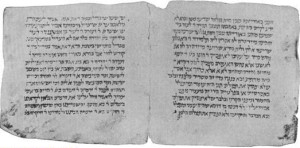 The Jerusalem Talmud relies heavily on tannaitic traditions (baraitot) and often appears to be a compilation of such traditions with brief amoraic conclusions or explanations. In the excerpt which follows, this is the case as the Gemara emphasizes the need to avoid distraction during prayers and Grace after Meals.
The Jerusalem Talmud relies heavily on tannaitic traditions (baraitot) and often appears to be a compilation of such traditions with brief amoraic conclusions or explanations. In the excerpt which follows, this is the case as the Gemara emphasizes the need to avoid distraction during prayers and Grace after Meals.
A tanna taught, “One may not wink his eyes while reciting [the Shema].”
A tanna taught, “Workers who were doing work for their employer recite the first blessing [of the Grace after Meals], and then include Jerusalem and the Land 26 in a single blessing ending with a reference to the Land. But if they were working for him in return for their meals, or if their employer ate with them, they recite all four [benedictions]. 27
Rabbi Mana 28 said, “This teaches that it is forbidden to work while reciting the Grace after Meals, for otherwise we would say that they should do their work and recite the [complete] blessings [while working].”
25. Trans. S. Berrin.
26. Usually two separate benedictions.
27. The complete Grace after Meals.
28. A Palestinian amora.